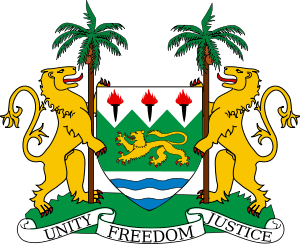Sierra Leonean general election, 1967
 |
| This article is part of a series on the politics and government of Sierra Leone |
|
Legislative
|
|
General elections were held in Sierra Leone on 17 March 1967.[1] They were won by the opposition All People's Congress,[2] marking the first time that a ruling party had lost an election in sub-Saharan Africa (excluding white-ruled South Africa and Southern Rhodesia).[3][4] However, a military coup prevented the APC from taking power until a counter-coup in 1968.
Background
Although the Sierra Leone People's Party had won the previous elections in 1962, it had become increasingly unpopular, in part due to Albert Margai's unsuccessful attempts to convert the country into a one-party state, accusations of corruption, and an attempt to prevent opposition parties running against him and three other SLPP candidates.[3]
There was also an ethnic dimension to the elections; the SLPP tended to be supported by the Mende, Sherbro and Fula, whilst the APC was more popular amongst the Temne, Susu, Loko, Mandinka and Creoles. Antagonism towards the SLPP had grown due to the Margai's promotion of several Mendes to prominent positions with the country's civil service and the fact that the group were beginning to dominate the country's army.[5]
Results
| Party | Votes | % | Seats | +/- |
|---|---|---|---|---|
| All People's Congress | 279,515 | 44.9 | 32 | +16 |
| Sierra Leone People's Party | 230,999 | 37.1 | 28 | 0 |
| Independents | 111,936 | 18.0 | 6 | -8 |
| Indirectly elected paramount chiefs | - | - | 12 | 0 |
| Total | 622,650 | 100 | 78 | +4 |
| Source: Nohlen et al. | ||||
Aftermath
Although Governor-General Henry Josiah Lightfoot Boston swore in APC leader Siaka Stevens as the country's new Prime Minister on 21 March, a military coup took place a few hours later. Led by David Lansana, the army put both Stevens and Boston under house arrest on the grounds that the determination of office should await the election of the tribal representatives to the house. Lansana himself was overthrown on 23 March by a group led Andrew Juxon-Smith which named themselves the National Reformation Council, suspended the country's constitution and also placed Margai under arrest. However, on 18 April 1968 there was a "sergeants' revolt" by the Anti-Corruption Revolutionary Movement led by John Amadu Bangura. NRC members were imprisoned, and other army and police officers deposed. Stevens was allowed to assume the office of Prime Minister under the restored constitution.
References
- ↑ Fisher, H.J. (1969) "Elections and Coups in Sierra Leone, 1967" The Journal of Modern African Studies Vol. 7, No. 4 pp. 611-636
- ↑ Nohlen, D, Krennerich, M & Thibaut, B (1999) Elections in Africa: A data handbook, p799 ISBN 0-19-829645-2
- 1 2 End of the Exception Time, 31 March 1967
- ↑ Hirsch, J.L. (2001) Sierra Leone: Diamonds and the Struggle for Democracy
- ↑ Horowitz, D.L. (1985) Ethnic Groups in Conflict